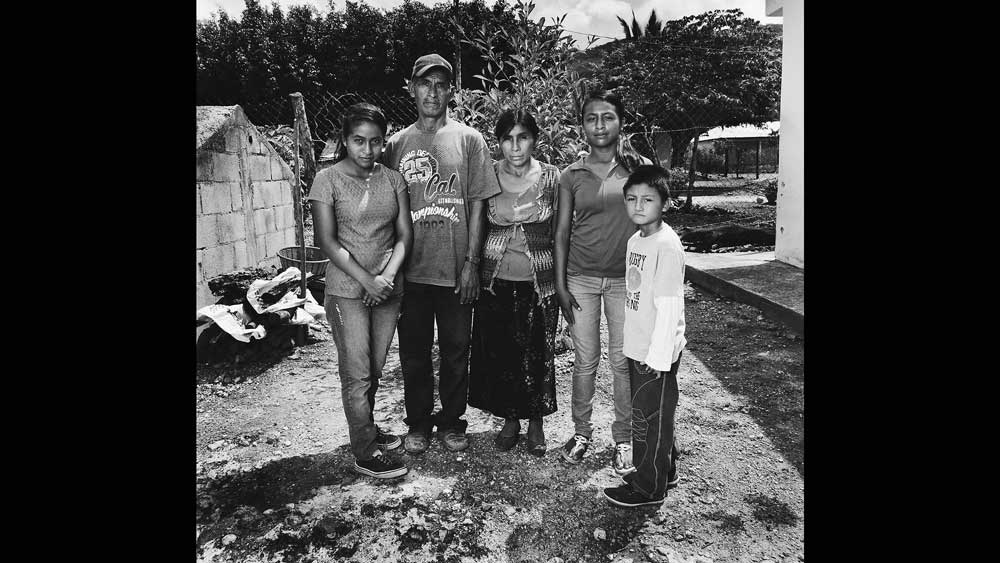A sense of belonging
Professor works with indigenous migrant communities in the United States and Mexico

Oscar Gil-García’s research on individuals and families affected by immigration policies is personal.
“Living in a ‘mixed-status family’ comes with certain experiences and, ultimately, the fear of deportations,” says Gil-García, an assistant professor of human development in the College of Community and Public Affairs (CCPA).
“Mixed-status” means family members have different legal statuses, including citizenship.
“My parents and many of my family members did not have legal status as American citizens, which meant they had to take jobs that paid less than minimum wage,” says Gil-García, who was born in New York City where, as a child, he observed immigration agents raid and deport family members at home. “It also required me to step up to the plate and help out economically.”
Gil-García studies forced migration through policy analysis and fieldwork. For more than a decade he has worked with indigenous Mayans from Guatemala who fled to Mexico in the 1980s to escape military conflict. More than 43,000 indigenous Mayans established settlement camps throughout southern Mexico. He conducts research in the largest of these settlements, specifically within La Gloria, located near the border of Guatemala.
“The creativity and the courage of the [Guatemalan] people and their determination to create a community, despite experiencing enormous violence, prompted me to do work in La Gloria,” says Gil-García, who received his master’s and doctoral degrees in sociology from the University of California, Santa Barbara.
His research has been published in Current Sociology and The International Journal of Technology, Knowledge and Society. He also has contributed a book chapter, translated to German, in Asylum: 20th Century Case Studies.
Gil-García and his brother Manuel completed a photo-documentary series of the La Gloria community in early 2016. Manuel, who is a professional photographer, captured 26 “stateless subjects” who are fighting for Mexican citizenship.
“Manuel’s portraits and my writing help to illustrate the people’s inherent strengths; strategies for survival; and the social, economic and political barriers they face as refugees,” Gil-García says.
“Using portraiture gives me the opportunity to communicate and get closer to subjects to better understand them,” Manuel says. “One of the individuals I photographed, Angél, watched his father, sister and brother get assassinated by Guatemalan military forces as a child.”
“These portraits are also a reflection of the 9 million mixed-status families in the United States. Despite a majority of the undocumented immigrants having lived in America for 10 years or more, reduced legal options to regularize status leaves family members — documented and undocumented alike — vulnerable to family separations as a consequence of deportations. And this is a fear shared by many people in my photos,” Manuel says.
Following a three-year collaboration with Mexican attorney Julia Torres and community members, Gil-García successfully obtained legal status for all 26 of Manuel’s stateless subjects in September 2016.
Gil-García’s research has several threads, including the Guatemalan settlement in Mexico, migration to the United States, labor-force participation, deportations to Mexico and the ongoing struggle to obtain legal status once in Mexico and the U.S.
Gil-García says there are universal struggles for refugees and undocumented immigrants, regardless of the borders that surround them.
“Many of my ethnographic subjects have said, ‘Because I don’t have legal status I can’t really earn a living wage’,” he says. “They have expressed they were unable to provide the things their children need, forcing their children to enter the labor force much earlier than the parents would have desired.”
Teaching inclusion, inspiring action
Gil-García — who joined the human development faculty in fall 2016 — teaches HDEV 379: Migration, Citizenship and Social Justice, a course offered through the University’s minor in immigration studies. He is also a member of the Migration Working Group affiliated with the Citizenship, Rights and Cultural Belonging Transdisciplinary Area of Excellence (TAE).
Gil-García and Associate Professor and CCPA Doctoral Program Director Elizabeth Mellin are currently collaborating on a project funded by a Citizenship, Rights and Cultural Belonging TAE seed grant — working with unaccompanied immigrant youths from Central America who live in the United States.
“This work builds on my interest in inter-national migration, but moves in important new directions to explore the long-term health impacts of restrictive immigration policies in the United States toward unaccompanied minors and families,” he says.
The study, titled “Immigrant Minors’ Access to Care Following Medi-Cal Expansion at a School-Based Health Clinic,” will focus on barriers to migrant healthcare.
Gil-García says the Human Development Department’s commitment to social justice and advocacy convinced him to come to Binghamton.
“The department faculty are committed to social justice,” he says. “It was quite evident during my faculty interview that it is central to the purpose and aim of the department.”
Teaching at CCPA, he says, is helping him to teach students the importance of advocacy.
“I conduct research and writing that has greater impact toward bringing about social justice for a community that has fought for decades,” Gil-García says. “In the classroom, I get to shape students to become catalysts for social change in the locality, state, nation and world.”
